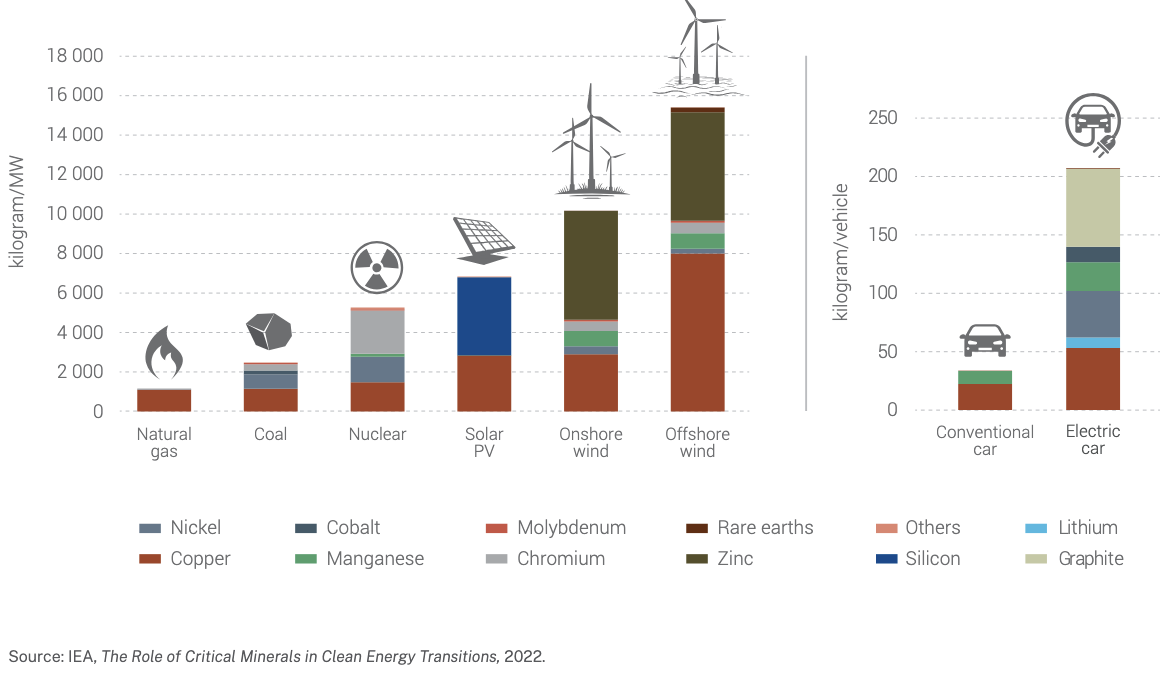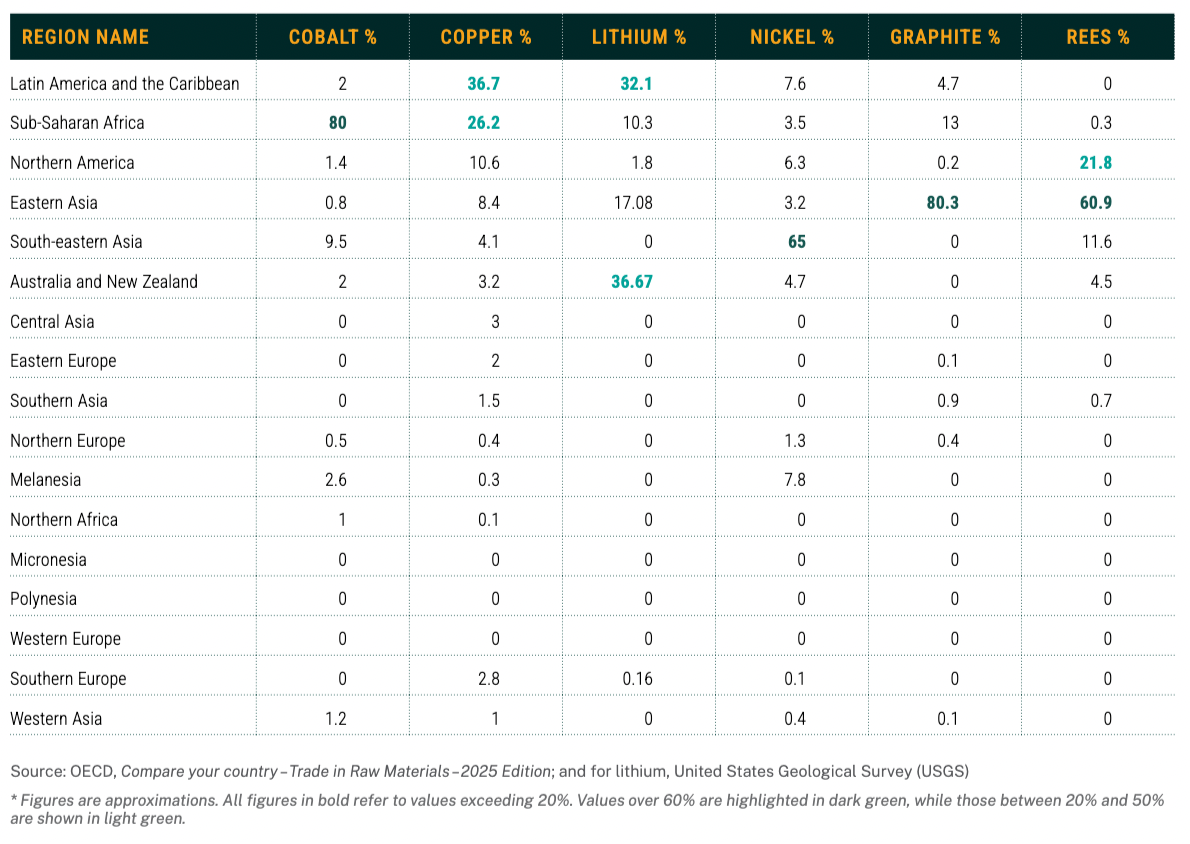How Our Thirst For Green Energy Is Driving Organized Crime
Have you ever thought about what powers your electric scooter, or keeps the giant blades of a wind turbine spinning? It all comes down to special materials called Critical Energy Transition Minerals (CETMs).
These are ingredients for a clean energy future—things like lithium, copper, and cobalt that are essential for making electric car batteries, solar panels, and wind farms.
We are all working hard to fight climate change and move away from dirty fossil fuels. This means the world needs a lot more of these special minerals, and we need them fast!. Because of this huge demand, a dark and sneaky problem is growing - minerals crime.
A new report from the United Nations (UNODC) tells us that bad guys, including criminal groups and even some dishonest companies, are sneaking into the supply chains of these important minerals.
This isn't just about stealing rocks; it's about cheating the system, polluting our planet, hurting local communities, and slowing down our efforts to create a sustainable world.
Why Is Crime Rampant?
Imagine a treasure chest full of critical minerals needed for a clean future. Everyone is rushing to get this treasure! This massive and growing demand for critical minerals is the main thing driving minerals crime.
Big Money, Big Temptation - Because the demand is so high, these minerals are worth a lot of money. This attracts professional bad-guy groups, like Organized Crime Groups (OCGs), who are ready to break the law to get rich.
Too Few Places - Many of these minerals are only found in a few countries, and they are mostly processed in a handful of others. This concentration makes the supply chain risky because if something goes wrong in one place, it affects the whole world.
Percent of critical minerals by Country
Weak Rules, Easy Cheats - In some countries where the minerals are mined, the government rules are weak, or the police don't have enough power. This creates "gaps" that criminals love to exploit. They use tricks like bribery to get control of mines, transport trucks, or processing centers.
When criminals get involved, they mess up everything. They take money away from the local governments, which means less funding for schools and hospitals. They also make the global market unstable and threaten the efforts of honest companies trying to "responsibly source" their materials.
The Number One Enabler - Corruption
The single most important reason minerals crime happens is corruption. Think of corruption as a sneaky, silent partner to all other crimes. It's the act of people in power—like government officials or company leaders—using their position for unfair, secret personal gain.
Corruption can take various forms, including active and passive bribery, favoritism, abuse of office, embezzlement, and trading in influence, and can involve a wide range of actors, from public officials and environmental authorities to customs officers, traders, refiners, and politically connected individuals.
High-level corruption has been linked to the allocation of land concessions, preferential contracting, and board-level appointments within mining companies.
How Corruption Works:
Buying the Right to Dig - Corruption is most common at the very beginning of a mining project, when companies are trying to get the licenses and land agreements to start digging. A dishonest company might bribe an official to get a license faster or to get a better piece of land, even if they aren't the best company for the job.
Skipping the Rules - Corruption allows companies to skip important safety checks or environmental protections. For example, a company might bribe an environmental inspector to pretend they didn't see the pollution happening at the mine site.
The Chain Reaction - Once corruption opens the door, it lets in other crimes like illegal mining, smuggling, and tax evasion (not paying taxes). In countries with political problems, corruption can even lead to more serious issues like conflict financing and human rights abuses. In fact, the report found that corruption is one of the most common crimes that police actually try to stop and punish in this area.
The Actors: Who is Breaking the Rules?
Minerals crime is not just the work of a few petty thieves. It involves many different types of actors, including those who look completely legitimate on the outside.
Corporations
Corporations might illegally get their exploration permits, break laws about how they treat workers (labor violations), pollute the air and water, or commit financial crimes like avoiding taxes (tax evasion) and lying about their business in their paperwork.
Because they are big companies that operate openly, it's very hard for police to find and stop their illegal activities. They use "front companies" or "shell companies" to hide their dirty money and make it look like it came from a legal source.
The Small, Vulnerable Miners
While large companies dominate, there are also many people who do Artisanal and Small-Scale Mining (ASM). These are often poor, local community members who dig for minerals by hand or with very simple tools.
The report warns that ASM is particularly easy for organized crime groups to exploit. These small miners are often forced to work under terrible conditions.
In many countries, the laws for these small-scale miners are weak or don't even exist, creating a "blind spot" in the global supply chain. These miners often work next to big, legal mines, which causes conflict over who has the right to the land.
The Crime Doesn't Stop at the Mine - Smuggling and Trafficking
When criminals steal or illegally mine minerals, they don't just keep them—they need to move them and sell them. This is called trafficking.
For most critical minerals, like copper, cobalt, and lithium, criminals don't try to hide tiny amounts in a suitcase like they might with gold. Instead, they smuggle huge shipments.
The crime relies on tricking the legal system:
False Paperwork: They create fake documents that lie about where the minerals came from (origin), where they are going (destination), or how much the shipment weighs.
Bribing Officials: They pay off customs or border officials to let the truck or container pass without checking the cargo.
These huge, illegal shipments destabilize the entire market and make it impossible for honest companies to prove that their minerals were sourced responsibly.
The Biggest Cost - Environmental and Social Harm
For people who care about sustainability, this is the most important part of the story. The crimes in the mineral supply chain hurt our planet and the people who live near the mines the most.
Environmental Destruction
When companies skip environmental rules (because of corruption), they may dump toxic waste into rivers or on the land without proper treatment. This pollutes the water people drink and the land where they grow food. In the US we have seen this issue for decades under the Superfund program.
Illegal mining operations often destroy the environment where they operate because they don't follow any rules about protecting the land or restoring it after they're done.
Human Rights Violations
Criminals and dishonest companies exploit the poorest people. This includes forcing adults to work for little or no money (forced labor) and, tragically, forcing children to work in dangerous conditions when they should be in school
Mineral crime often happens in places that are already dealing with political problems. The money from illegal minerals can be used to fund conflicts and make unstable regions even more dangerous.
When criminals take the money and avoid paying taxes, the local communities lose out on the benefits of their own natural resources. This stops them from building a sustainable future for themselves.
What Can Be Done?
We can't have a truly clean energy future if the minerals we use come from a dirty system. The UNODC report makes it clear that we need to take action right now.
Stronger Laws and Policing
Make Companies Accountable - We need stronger, more consistent laws around the world that can punish companies (corporations) for committing environmental and financial crimes. Currently, it is very hard to investigate and prosecute these big corporate crimes.
Guard the Borders - Law enforcement, like customs officers at ports and borders, need better training and tools to detect and stop the illegal trafficking of huge mineral shipments.
Transparency and Honesty
No More Secrets - Governments need to make all mining contracts and payments public. Even more importantly, they should make it mandatory to disclose who the real owners of the mining companies are (this is called "beneficial ownership"). This stops criminals from hiding behind shell companies.
Fill the Data Gaps - We need better information about where minerals are mined, especially from the small-scale mining areas, so that criminals can't hide their illegal activities in the dark.
Responsible Buying (Due Diligence)
Check, Check, and Check Again - Companies that buy minerals for our electric cars and solar panels must practice "due diligence." This means they can't just avoid countries they think are risky. They must actively work with local governments and communities to make sure their supply chains are fair, legal, and support sustainable development for the people who rely on mining for their livelihoods. It’s about being a positive force, not just avoiding trouble
Stop Corruption at the Source - Everyone must focus on preventing bribery and corruption from the very beginning of any mining project.






